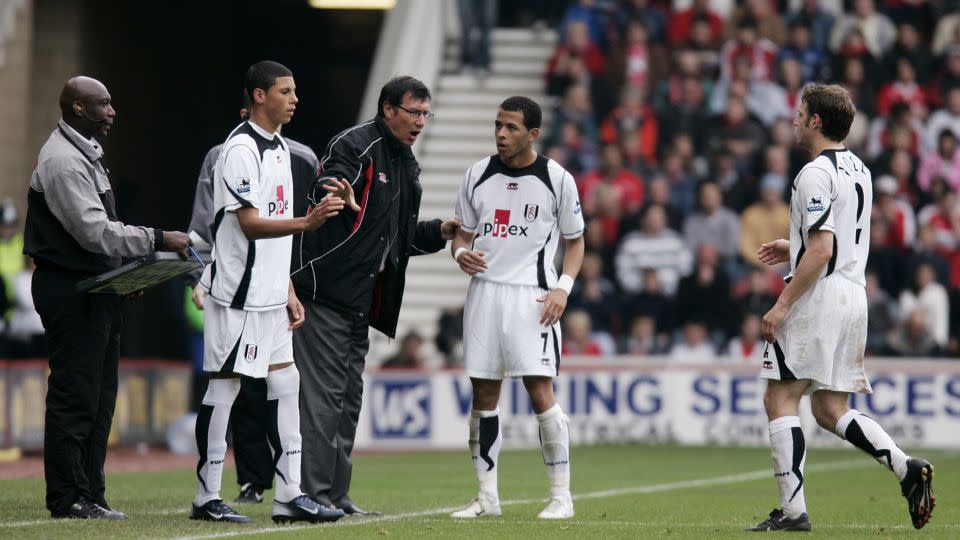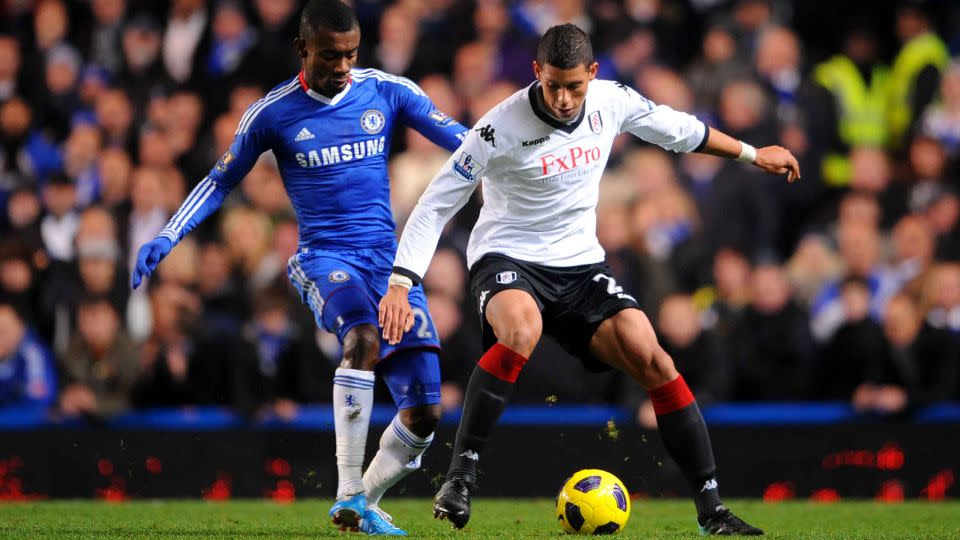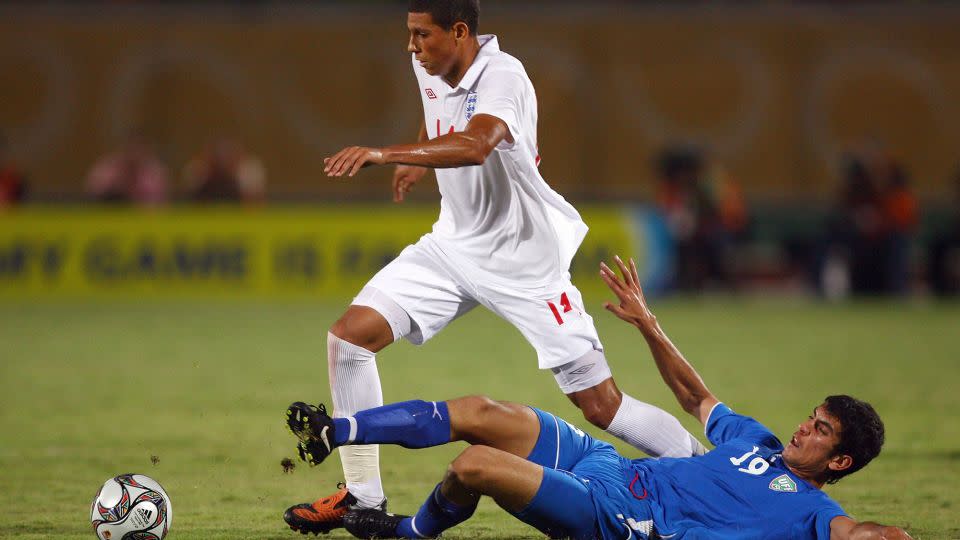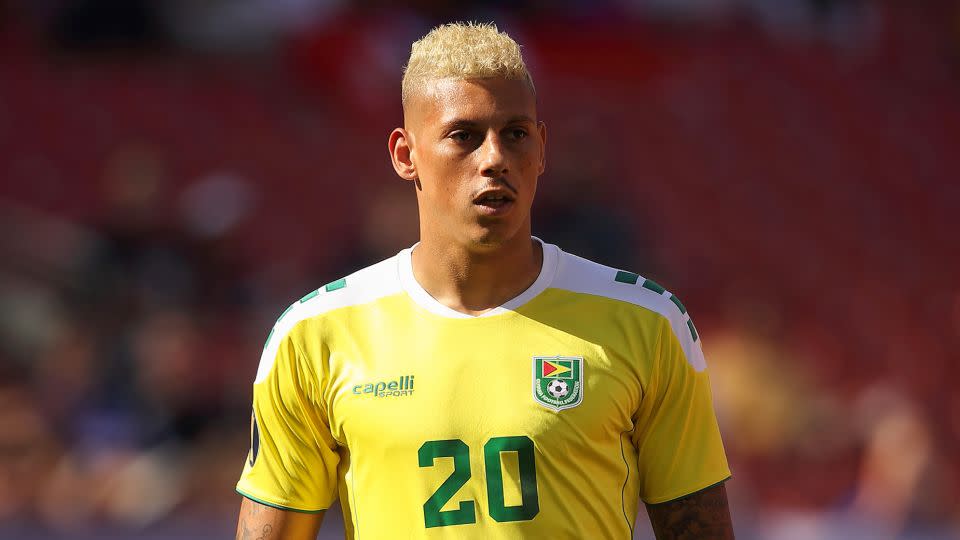This former soccer prodigy made his debut at 16. 11 years later, he was left feeling suicidal
Editor’s Note: If you are in the US and you or a loved one have contemplated suicide, call the National Suicide and Crisis Lifeline at 988 or 1-800-273-TALK (8255) to connect with a trained counselor. It provides free and confidential support 24 hours a day, seven days a week for people in suicidal crisis or distress. For crisis support in Spanish, call 1-888-628-9454. Outside the US, a worldwide directory of resources and international hotlines is provided by the International Association for Suicide Prevention, and you can turn to Befrienders Worldwide.
Matthew Briggs was still at school when he made soccer history, becoming the youngest player to feature in the English Premier League.
The teenage sensation was just 16 years and 65 days old when he made his debut in arguably the toughest league in the world, coming on as a second-half substitute for Fulham in a 3-1 win in 2007.
That “surreal moment” seemingly was the start of an exciting career in the game – Briggs was once tipped as a future England captain. Instead it was the beginning of a tumultuous journey which hit rock bottom as he stood on the edge of a hotel balcony in Dubai.
“I had pushed myself from my family and my friends. I felt like I had nobody,” Briggs tells CNN Sport, reflecting on how he felt in 2018.
“I was thinking, ‘What’s the point? I might as well just end it all now because all that I’m feeling will stop.’”
Bright beginnings
Briggs was one of the country’s most exciting young talents as a teenager and he progressed quickly through the youth ranks.
He was bigger, faster and stronger than his peers, meaning he would regularly play in the older age groups. If he was growing up in the US, he jokes, he would have been the “jock.”
He joined Fulham’s academy but was always being tracked by some of England’s biggest clubs, namely the likes of Arsenal.
It was at this time, with Briggs weighing up his options, that Fulham fast-tracked him to the first-team for the last game of the 2006/07 season.
Briggs was rewarded with a cameo appearance, coming on for the last 13 minutes against Middlesborough to write his name into the record books.
“When I made my debut, I was instantly thinking I’m the next Wayne Rooney, as any kid would,” Briggs says, referring to the former Premier League star.
“Everyone started looking at me like a superstar, like a famous person, when I didn’t feel like that myself.”

After making his first senior appearance, Briggs had assumed he would be part of the first-team’s plans the following season.
Instead, he was sent back to the youth team, a decision which knocked his confidence.
“I started feeling stuff that I’d never done before,” he says. “Overthinking game situations, thinking I’m going to have a bad game, just constantly doubting myself all the time.”
They were feelings that Briggs bottled up, as many of his peers did, nervous to expose any potential weakness at such a pivotal moment in his young career.
Downward spiral
The teenager was almost living a double life. To those on the outside, Briggs was still full of confidence, still the next best thing, still “the man.”
But things on the pitch were not getting better. He spent time away from Fulham on loan at other clubs but nothing really worked out.
He eventually left the club in 2014 having made just 13 Premier League appearances in the seven years since making his debut.
Briggs began slipping down the divisions, hampered by injuries, low confidence and a worsening struggle with mental health.
He suddenly found himself playing in non-league, a level he never imagined he would ever be at.
A sense of lost potential and the misplaced feeling of letting people down was the final straw, and Briggs eventually “exploded.”
He stopped playing soccer for a year in 2018, turning to alcohol and drugs in search of the feeling he once had playing in front of thousands of spectators.
“Where else can I find this adrenaline? Where else can I go and be the man? It was in the clubs,” he says.
“It was going out partying because I knew, if I go out, people are going to recognize me and I know who I am and I’m going to feel like the man again.”

It got to the point where Briggs began using substances to self-medicate his struggles with anxiety and depression, looking for anything to numb the pain. He could no longer watch soccer, unable to deal with the thought of what could have been.
‘Who am I if I’m not a footballer?’
The partying took him to vacation in Dubai, where he was also searching for a club to start playing for.
But he kept hearing rejections and everything became too much. It left him on his hotel balcony, contemplating whether life was still worth living.
“I was so used to hearing, ‘Yes, yes, yes,’ every single club in the country wanting Matthew Briggs,” he says.
“It got to the point where I felt like I was a nobody. Who am I if I’m not a footballer?”
Fortunately, he says hotel security saw him and moved him to a room on the lower floor. It’s a moment Briggs says he often thinks about and is now so grateful to those who stopped him from stepping off.
In the year when he walked away from soccer, Briggs moved in with his uncle. While he remembers some dark days when he would just sit in a room with his thoughts, he also credits that period with turning his life around.
His uncle found him some work on a building site, where Briggs helped out with construction. The job helped rebuild his confidence but also served as a warning shot. He wanted more from life, and it motivated him to get back into the game he loved.
He started therapy, leaning on the resources offered by the Professional Footballers Association (PFA) – a union for all current and former players.
For the first time in his life, Briggs learned how to deal with the feelings he had struggled with for years. He allowed himself to feel vulnerable and slowly began building his life back.
He also started “begging” former clubs for another chance.
He eventually signed for another non-league side and had “one of the best seasons I’ve ever had in my career.” While he was clearly too good for that level, the experience allowed Briggs to fall in love with the sport all over again.
While never receiving a call up to the England senior team – Briggs did play for the England youth sides – he had previously played internationally for Guyana in 2015. After a four-year hiatus, he managed to persuade the national team to also give him another chance.
In 2019, Briggs made the squad for Guyana’s CONCACAF Gold Cup campaign and relished the opportunity.

He was back playing in front of major crowds and lined up against the US men’s team, Panama and Trinidad & Tobago.
While Guyana finished bottom of the group – picking up its first ever Gold Cup point in the process – Briggs impressed and was scouted by Danish side HB Køge.
It offered him a ticket back to playing professional soccer – a moment that still fills him with immense pride.
“I’ve gone from not playing football at all anymore, feeling suicidal, to then getting myself back into the game and managing to get myself back to playing professionally,” he says.
“After that, I then became captain of my country. For me, that’s probably my proudest moment because it shows that it’s never too late to start again.”
‘Victim of my own success’
Having retired from soccer in 2023 following a string of injuries, Briggs struggled with the prospect of what would come next.
He once again leaned on support which helped him discover a passion for helping young players in the game today.
He is now back at Fulham, where his odyssey began, working with academy players and providing support to young stars who are starting to forge a career in the game.
Teaching teenagers to communicate their worries and fears – something Briggs only learned later in life – is one of the main focuses of his work, as well as fostering an environment where people feel safe being vulnerable.
“I was probably a victim of my own success. I went up to the first team and kind of got lost in that environment.
“Whereas now, when young players do achieve what they deserve and go with the first team, we make sure we keep that connection with them.”

Briggs is fully aware his story isn’t entirely unique. Thousands of young players are fed into the academy system every year, with only a tiny percentage ever making it.
He says the support and pastoral care is now “head and shoulders” above what he experienced as a child.
For example, in 2012, the Elite Player Performance Plan (EPPP) was launched by the English Premier League and offered clubs more guidance around player care.
“Ensuring that the Academy experience is a life-enriching one for every young player is a key part of taking a broader view of success,” Neil Saunders, the Premier League’s director of football, said in 2022.
“Not just judging the success of the system by those players that go on and play in the first team, but also what destination those players go on to have beyond playing.”
There is also support offered by the PFA – a service which Briggs leant on during his career.
“We encourage players to seek help and use the resources available to them. The PFA has empathetic, experienced professionals and extensive provisions to assist players in navigating challenges both inside and outside the game,” the PFA said in a statement.
Finding peace
Briggs held the Premier League record for the youngest player for 12 years, before it was broken by current Liverpool star Harvey Elliot, who was also handed his debut by Fulham in 2019. The record was broken again by Arsenal’s Ethan Nwaneri in 2022.
Briggs has since described Elliot breaking his record as a “bittersweet” moment. On one hand, he was sad to lose such a prestigious accolade but, on the other, he felt the pressure lift from his shoulders.
Now, he says he wants to use his story to “help, motivate and inspire others.”
For more CNN news and newsletters create an account at CNN.com
